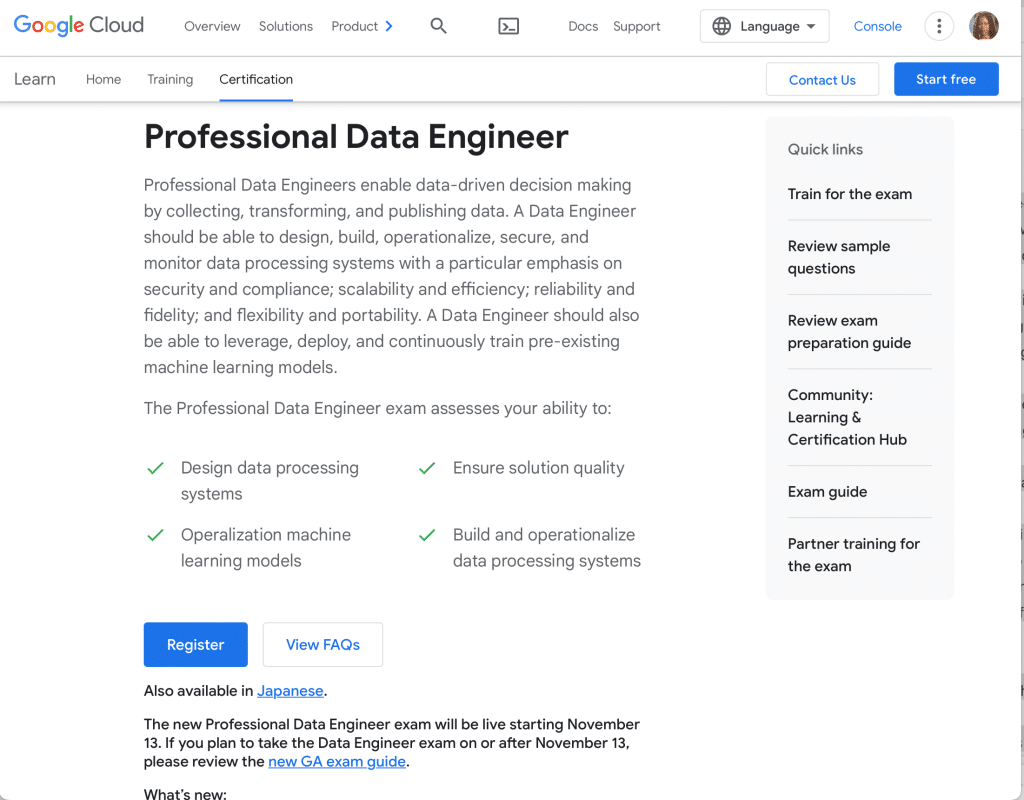In today’s data-driven world, a career as a data engineer offers countless opportunities for growth and development.
Not only is this field in high demand, but it also promises a rewarding and fulfilling career path, well, we think so.
Your career progression as a data engineer might look something like this:
Junior Data Engineer
Data Engineer
Senior Data Engineer
Lead Data Engineer
Chief Data officer
This article will show you what you can expect in each of these positions and will give you tips to help you ace your data engineering interviews and career.
No matter where you are in your career, taking steps to become a data engineer is a smart move.
By acquiring the right skills, education, and experience, you’ll be well-equipped to thrive in this in-demand and ever-evolving field.
Let’s dive in!

What is a Data Engineer?
Data engineers design and maintain the infrastructure necessary to collect, store, and transform raw data into valuable insights.
Also, they possess strong programming skills, expertise in data modeling, and a deep understanding of algorithms, allowing them to construct complex data pipelines.
These professionals play a crucial role in various sectors, ensuring organizations have access to high-quality data for informed decision-making and analysis.
Let’s look at the key skills needed to succeed as a data engineer.
Data Engineer Key Skills

Data engineers are at the forefront of data management and transformation, making their skills a critical asset to any organization.
Here are some key skills that are essential for success in this role:
Programming Proficiency: You must excel in programming languages such as Python, Java, Scala, and SQL to manipulate and manage data effectively.
Data Modeling: Strong knowledge of data modeling techniques is essential for creating efficient data structures and databases.
Algorithm Expertise: You should have a deep understanding of algorithms to optimize data processing and transformation.
Data Integration: The ability to integrate data from various sources is crucial for building comprehensive and reliable datasets.
Big Data Tools: Familiarity with big data tools and frameworks like Hadoop, Apache Spark, and data warehousing solutions is vital for handling large volumes of data efficiently and effectively.
These key skills will enable to excel in your data engineering role, providing organizations with high-quality, well-managed data that fuels informed decision-making.
A Typical Data Engineer Career Path
The career path of a data engineer is a dynamic journey that offers a range of opportunities for individuals interested in working with data.
Furthermore, data engineers play a vital role in today’s data-driven world, and their career progression typically follows a structured trajectory.
Here’s an overview of the key stages in a data engineer career roadmap:
1. Junior Data Engineer

Junior Data Engineers are the entry point to a data engineer’s career path, tasked with foundational responsibilities that underpin more advanced data engineering tasks.
Your primary duties could include:
Data Collection: Assisting in collecting and consolidating data from various sources.
Basic Data Transformation: Participating in data cleaning, validation, and basic manipulation to prepare data for analysis.
Database Maintenance: Contributing to database management, optimizing and maintaining data tables.
Data Pipeline Development: Working on developing and maintaining data pipelines, automating data flow.
Quality Assurance: Assisting in data quality checks and validation procedures.
This role offers invaluable hands-on experience and a foundational understanding of the data engineer’s workflow.
Also, it serves as a springboard to more complex and responsible positions in the data engineering field.
Junior Data Engineer Salary: $68k – $117k per year
2. Data Engineer

The next step up the career ladder is the Data Engineer position.
Data Engineers are central figures in the data-driven landscape, responsible for crafting and upholding the infrastructure that enables organizations to collect, store, and process data efficiently.
Your role could encompass:
Advanced Data Transformation: Developing and applying complex data transformation logic to create structured, usable data.
Database Design: Participating in database design, create and manage data tables, and conduct routine maintenance.
Data Pipeline Optimization: Designing and optimizing data pipelines, ensuring efficient data flow.
Big Data Tools: Working with big data tools like Hadoop and Apache Spark to handle large datasets.
Data Integration: Integrating data from various sources into a data warehouse, ensuring data consistency.
Collaboration with Data Scientists: Collaborating closely with data scientists to understand data requirements and facilitate advanced data analysis.
Data Engineers’ expertise in these tasks is pivotal for an organization’s data infrastructure, ensuring that data is accessible, accurate, and readily available for accurate decision-making
Data Engineer Salary: $93k – $151k per year
A key part of your role in data will be in data loading and transformation; check out our latest clip below to learn more.
Now, let’s look a little higher into the role of a Senior Data Engineer.
3. Senior Data Engineer

The Senior Data Engineer role represents a significant milestone in the data engineering career path, marked by increased responsibilities and leadership within the field.
These professionals are entrusted with tasks that require substantial expertise and experience, including:
Data Architecture: Lead and make high-level decisions about data infrastructure and architecture.
Team Leadership: Manage data engineering teams, provide mentorship to junior team members.
Data Security and Compliance: Ensure data security and compliance with data protection regulations.
Complex ETL Processes: Develop and maintain complex Extract, Transform, Load (ETL) processes for large-scale data.
Strategic Data Projects: Lead critical data-related projects and strategic initiatives within the organization.
The Senior Data Engineer position represents the culmination of years of experience and expertise in data engineering, with a focus on data architecture, leadership, and complex data operations.
They play a pivotal role in shaping an organization’s data infrastructure and strategy.
Senior Data Engineer Salary: $130k – $199k per year
Now, let’s take a look at specializations.
4. Specializations within Data Engineering

Data engineering offers diverse opportunities for specialization, allowing you to focus on specific technical expertise or niche industries.
Here are some key specializations within the field:
Big Data Engineers: Big Data Engineers are specialists in handling and processing large-scale datasets. They work with technologies like Hadoop and Apache Spark to efficiently manage and analyze vast volumes of data.
Big Data Engineers are critical in organizations that deal with immense data flows, such as those in e-commerce, social media, and finance.
Cloud Data Engineers: Cloud Data Engineers specialize in data engineering within cloud platforms like AWS, Azure, or Google Cloud. They design and manage data solutions that leverage the scalability and flexibility of cloud services.
This specialization is ideal for businesses transitioning to or already operating in the cloud.
Real-time Data Engineers: Real-time Data Engineers focus on data streaming and real-time analytics. They work with technologies like Kafka and Flink to process and analyze data as it is generated, enabling immediate insights and actions.
This specialization is crucial in industries that require instant data-driven decision-making, such as IoT, healthcare, and finance.
ETL (Extract, Transform, Load) Engineers: ETL Engineers specialize in designing and managing Extract, Transform, Load (ETL) processes. They are experts in integrating data from diverse sources, transforming it into a usable format, and loading it into data warehouses.
ETL Engineers are essential for businesses that rely on comprehensive data integration, such as retail, marketing, and logistics.
Each specialization caters to specific data engineering needs and industries, allowing professionals to align their expertise with their interests and career goals.
Whether you choose to work with big data, cloud platforms, real-time data, or ETL processes, these specializations offer exciting and rewarding avenues in the data engineering field.
So, what does your career look like when you have reached the top?
Let’s check out some options.
5. Positions Beyond Senior Data Engineer Roles

For data professionals seeking positions beyond the Senior Data Engineer’s role, there are several elevated career paths and titles to consider, each with its unique responsibilities and challenges.
Some of these positions include:
Lead Data Engineer: These professionals take on a more senior role in data engineering teams, providing technical leadership, project oversight, and mentorship to junior team members. They play a key role in shaping the data engineering strategy and architecture within the organization.
Principal Data Engineer: Principal Data Engineers are experts in their field and often have extensive experience. They are responsible for designing and implementing complex data solutions, optimizing data pipelines, and ensuring data accuracy. They may also contribute to high-level data strategy and collaborate closely with other departments.
Data Engineering Manager: This position is a leadership role that involves overseeing an entire data engineering team. In addition to technical expertise, these professionals manage personnel, budgets, and project priorities. They are responsible for aligning data engineering efforts with the organization’s objectives and ensuring the team’s efficiency.
Director of Data Engineering: These professionals take on a strategic role, setting the long-term vision for data engineering within the organization. They are responsible for shaping data policies, fostering innovation, and ensuring data initiatives align with the company’s goals and industry standards.
Chief Data Officer (CDO): The Chief Data Officer is a C-level executive responsible for the organization’s entire data strategy, governance, and management. CDOs provide leadership and guidance at the highest levels, working to ensure data is leveraged as a strategic asset for the entire organization.
These positions represent career progression options for those who have accumulated extensive experience and demonstrated exceptional proficiency in data engineering.
Furthermore, they involve a greater degree of responsibility, leadership, and strategic decision-making within the data field.
Now, let’s take a look at the formal qualifications needed to become a data engineer.
Education Qualifications for Data Engineer

Data engineering is a field that values a strong educational foundation and practical skills.
While there are no strict educational prerequisites, certain qualifications can enhance your prospects as a data engineer:
Bachelor’s Degree: Many data engineers hold a bachelor’s degree in fields such as:
Computer science
Information technology
Data engineering
Software engineering
Mathematics
Statistics
These degrees provide a solid basis for data analysis and manipulation.
Relevant Courses: Continually supplement your education with relevant courses, workshops, or certifications that focus on data engineering tools, technologies, and methodologies.
Online platforms and institutions offer a wide range of courses that can boost your knowledge and skills.
Advanced Degrees: Some data engineers pursue master’s or advanced degrees such as:
Data engineering
Computer science, or related fields.
These fields deepen expertise and career prospects.
Ultimately, while formal education can provide a strong foundation, practical experience, and skill development play a significant role in a data engineer’s success.
Ideally, a combination of education and hands-on experience will help you excel in your role, design efficient data solutions, and contribute effectively to data-driven decision-making.
Professional Development and Certification

Your data engineer’s career path demands ongoing skill development to remain competitive and progress through the ranks.
To build a solid foundation, consider reputable courses offered by industry leaders such as Enterprise DNA, Amazon, Google, or IBM.
These hands-on courses help create a compelling portfolio, which not only attracts top employers but also demonstrates your practical grasp of data engineering concepts.
Certifications, though not mandatory, can bolster your credibility. Notable options include:
AWS Certified Data Analytics – Specialty
IBM Data Engineer – Mastery Award
As you advance, we recommend always pursuing additional certifications, courses, and training opportunities to expand your skills and stay current with industry trends.
Now, let’s get you interview ready.
How to Prepare for a Data Engineer Interview in 10 Simple Steps

Preparing for a data engineer interview is essential to showcase your skills and expertise.
Here are ten essential steps to help you get ready:
Step 1: Review Fundamentals: Brush up on fundamental concepts, including data modeling, algorithms, and database management.
Step 2: Master Data Tools and Technologies: Be well-versed in data engineering tools, databases, and frameworks relevant to the job you’re interviewing for.
Step 3: Practice Coding: Prepare for technical assessments by practicing coding exercises in Python, Java, or SQL.
Step 4: Data Transformation and ETL: Understand Extract, Transform, Load (ETL) processes and how to apply them effectively.
Step 5: Database Design: Be ready to discuss database design, table creation, and optimization.
Step 6: Data Quality Assurance: Demonstrate your ability to ensure data quality through validation and quality checks.
Step 7: Real-time Data and Streaming: If relevant to the position, understand data streaming and real-time data processing.
Step 8: Project Showcase: Be ready to discuss past data engineering projects in detail, highlighting your role and achievements.
Step 9: Soft Skills: Prepare to demonstrate strong problem-solving, communication, and collaboration skills.
By following these steps, you’ll be well-prepared to impress potential employers during your interview and advance in your data engineering career.
Final Thoughts
The data engineer career path offers a dynamic and rewarding journey for those passionate about data.
With the right education, skills, and continuous learning, individuals can forge a successful path from entry-level positions to senior roles in this critical field.
As organizations increasingly rely on data for decision-making, data engineers play an indispensable role in shaping the data landscape across various industries.
So, go ahead, embrace the opportunities within this in-demand career path, and embark on a journey of continuous growth and innovation!
Also, don’t forget to have fun along the way.
Frequently Asked Questions
Which tools are commonly used by data engineers?
Data engineers often use tools such as Apache Hadoop, Apache Spark, and Apache Flink for distributed data processing. Databases like MySQL, PostgreSQL, Cassandra, and MongoDB are essential for data management.
ETL (Extract, Transform, Load) tools like Apache NiFi, Talend, and Informatica are utilized for data integration. Moreover, cloud platforms such as AWS, Google Cloud, and Microsoft Azure enable the scaling and deployment of data pipelines.
How do data engineer roles differ from data analyst roles?
Data engineers focus on designing and maintaining systems for collecting, storing, and processing large volumes of data. Their primary responsibility is to develop robust and scalable data pipelines.
In contrast, data analysts interpret and analyze the data to derive insights that inform strategic decisions. They use tools like Excel, R, Python, and Tableau to visualize and communicate their findings.
What are some recommended courses for aspiring data engineers?
There are several online courses and programs designed to help you acquire essential data engineer skills. Platforms such as Coursera, Udacity, and EdX offer courses on Python, SQL, databases, and big data frameworks.
Additionally, you can find specialized courses for particular tools, like Apache Spark or Hadoop. It’s vital to continually learn and adapt, as new technologies emerge in the field.
What steps should one take to become a data engineer without a degree?
Even without a degree, you can become a data engineer by following these steps:
Learn the foundations of programming, databases, and data structures through online resources or books.
Complete relevant online courses, as mentioned in the previous question.
Build a strong portfolio by working on personal projects and showcasing your skills.
Network with professionals in the field, attend meetups, and participate in online forums.
Apply for internships or entry-level roles in data engineers field to gain real-world experience.
How does a data engineer career compare to a data scientist career?
Both data engineers and data scientists work with vast amounts of data, but their roles differ significantly. Data engineers focus on building and optimizing data pipelines, ensuring that data flows efficiently and reliably from various sources to the target system.
Data scientists, on the other hand, perform advanced analysis and develop machine learning models to extract valuable insights. While data engineers lay the groundwork for data science professionals to work with clean and accessible data, the latter specialize in making predictions and providing actionable outputs for the business.
What is the difference between a data engineer and a data architect:
Data engineers focus on the practical implementation of data solutions, including data collection, storage, and transformation. They work hands-on to design and maintain data infrastructure.








